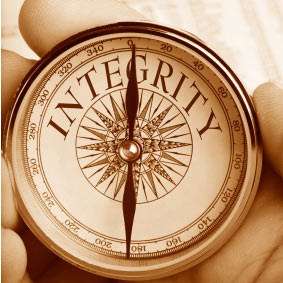Earlier this week I gave a keynote address at a conference of security professionals – a group whose integrity is embedded in their DNA.

“This Code of Conduct and Ethics signifies a voluntary assumption by members of the obligation of self-discipline above and beyond the requirements of the law… members intend to maintain a high level of ethics and professional service, and… in return for the faith that the public places in them, the members accept the obligation to conduct their practices in a way that will be beneficial to society.”
However, the added challenge was answering this question:How do we demonstrate to a prospective client that we’re not only professionally competent, but ethically committed?
Clearly, this was no small task because ethics is not about what we say or even what we intend. It’s about what we do.
I began by sharing a personal story of integrity from former Secret Service Director Lewis Merletti.
In 1998, for the first time in our nation’s history, the director of the United States Secret Service was asked to testify against a sitting president in court. Independent counsel Kenneth Starr wanted to question Merletti about Bill Clinton’s meetings with Monica Lewinsky. Starr was trying to find out whether the president lied under oath when he denied a sexual relationship with Lewinsky to Paula Jones’ lawyers.
In a declaration made in opposition to Starr’s Motion to Compel testimony from Secret Service agents, Merletti argued that agents could refuse to testify because they are shielded by a “protective envelope” privilege similar to those covering doctors, lawyers and clergy. If agents on the president’s protective detail were permitted to testify, Merletti said, they would “push back” agents at public events, compromising their protection, thus making them much more vulnerable to attack.
At the core of Merletti’s statement to Starr was this passionate defense of trust: “The motto of the United States Secret Service is ‘worthy of trust and confidence.’ This is the absolute heart and soul of the United States Secret Service,” Merletti told me in an interview. “This trust and confidence cannot be situational. It cannot have an expiration date. And it must never be compromised.”
During the course of the talk, I offered a few points – points that could be used by most of us when speaking to a potential client.
- In meeting with a prospective client, convey not only your knowledge of security issues but communicate the importance judgment, reliability and responsibility play in your work ethic.
- Communicate that your integrity requires open andhonest conversations about all issues that involve your work.
- Convey that honesty and responsibility are not simply words on a Mission Statement. They are ground rules of behavior that demonstrate to a client that when they think of integrity, they think of you.
- Point out that the key components of your integrity arecharacter and competence. These are qualities that generate long term trust.
Further, you can demonstrate what ethicist Michael Josephson calls The Three C’s of Ethics: Commitment, Consciousness and Competency.
We can enhance our ethical Commitment by communicating the practical benefits of trusting relationships.
Second, increase the Consciousness of ethics by considering the consequences of choices in terms of “stakeholders.” Who will be helped or harmed by the action we’re considering. Determine whether a decision will violate any of your core, ethical values or principles.
And third, stress to your client that you practice Competentmoral reasoning. Point out that that you evaluate facts in light of ethical principles; that you work to distinguish facts from informed opinions, speculation or assumptions. And that you strive, to the best of your ability, to anticipate any possible unintended consequences.
Finally, I asked Lew Merletti how he would address the issue of ethics before a prospective client.
“To me it is about leadership, ethics, and commitment. I believe that being the right person for any security position entails being an ethical leader and knowing your core values.
“I don’t believe leadership, ethics and commitment can be separated but rather are intrinsically interwoven. This has sustained me through my time in the military, in government, and in private practice.
“I also believe that one’s track record or past work history is prologue to their success or qualifications for future positions. These principles hold the key to success not only personally but for our country.
“Ethical leadership includes a vision, and the passion and strategy to see that vision become reality. It’s about self-dignity and a commitment to never settle for anything short of excellence.
“Success in a security position means safeguarding people and/or property. You cannot do that if you do not have the personal integrity and dedication to commit yourself 100%. You are responsible. You can’t delegate that responsibility.
“There is an invisible web of obligation for the welfare of those entrusted to your care that you have to commit yourself and which cannot be compromised.”
In speaking to any potential client, make clear that if you are hired, they will get the highest level of talent and integrity possible.
Comments










